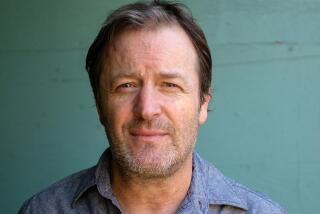Inhuman History : FICTION : HORSEMAN,<i> By Mike Nicol</i> .<i> Illustrations by David Jackson (Alfred A. Knopf: $23; 196 pp.)</i>
Mike Nicol’s third novel, “Horseman,” offers a harrowing view of human history that is as relentless as it is bleak. Human, in fact, seems hardly the adjective to describe Nicol’s take on history, for the vision born out of his native South Africa is one saturated by the brutality and enslavement that have gripped the land and its people for three centuries. “That which is done unto others has to be done unto the doer,” says a character early on in “Horseman,” but in a world where the only viable acts are those made in the name of “vengeance. Bloody and merciless vengeance,” Nicol clearly aims to turn the Golden Rule on its head.
In this manner “Horseman” is not confined to South Africa for its field of reference. Rather, given Nicol’s talent for silhouetting his characters against a mythic backdrop of forest, sea and dusty plain, the novel rides into town with the slow deliberation of an outlaw, the stranger everyone recognizes as trouble by the way he saunters out of the mist of the collective past. Be it Cape Town or Carson City, what follows is sure to mean bloodshed. Meanwhile, Nicol’s role is that of Ross in Macbeth, the witness to slaughter whose duty is to remind us that the “sighs and groans and shrieks that rend the air / Are made, not mark’d.”
Nicol, however, takes aim at history’s “groans and shrieks” in his attempt to reveal their source in the life of the novel’s protagonist. Set in 19th century Europe, the novel opens with a youth whose drunken father is carted away after being arrested for murder. Out of bitterness, the youth leaves his village and heads for the forest. There he’s seized by the woodsman Madach, who educates him in the wiles of vengeance and survival. Eventually captured by the townspeople after wreaking havoc on their lives, the youth is dragged off to a monastery to be reformed. But what follows is more violence and degradation as the elder of the monastery introduces the youth to a horrific vision of a “southern” landscape “hard and jagged . . . strewn with rocks that cut and thorns that impale every movement,” a realm where “there is nothing living except the scavengers.”
Clearly this is the South African veld, and clearly the youth is destined to become one of its scavengers. Indeed, after escaping from the monastery and rejoining Madach, the youth sets off with him on a sea voyage to “a wild and distant place, a ridge of goldfields with its towns and industry,” the youth possessed by the vision, “black and gross, that he could not shed but which was of him and in him and stood in cowled and unfaced silence, invincible in battles where demons leapt from bodies of the slain.” Rather than submit to this image of the Grim Reaper, however, the youth becomes him.
Realism and character motivation are not Nicol’s concern. Instead, “Horseman” operates as a sort of history according to type, be it that of the imperialist, the zealous missionary, the corrupt official, the whore or the slave trader.
Yet, despite Nicol’s powerful version of history’s dark tale, this is an imposing flaw at the heart of “Horseman.” The figures that ride “Horseman” toward its menacing end seem more the symbols of horror than actual people. Given the surreal appetite for atrocity that humankind seems so bent on displaying to this very day, one could say the same about the madmen of history, namely that the horror they enact is more real than their reality as human beings.
But the existence of such evil is more difficult than that, even more menacing. Indeed, if as Macbeth says, life were only “a tale / Told by an idiot, full of sound and fury / Signifying nothing,” any act of atrocity would be just that--yet another tale and no more. Instead, the real horror is that slaughter occurs in the history of humanity, running parallel to the equally powerful strains of innocence and hope.
More to Read
Sign up for our Book Club newsletter
Get the latest news, events and more from the Los Angeles Times Book Club, and help us get L.A. reading and talking.
You may occasionally receive promotional content from the Los Angeles Times.







